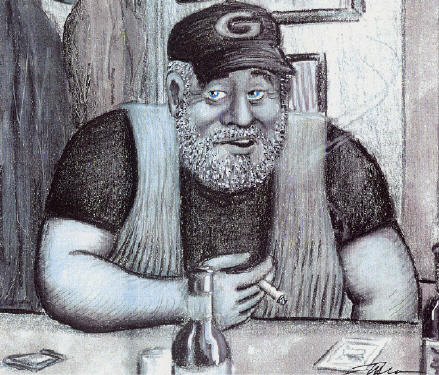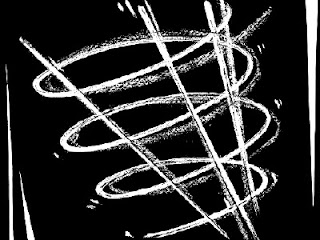Note: These obituaries I penned for what were three popular Fan District restaurants were originally published by Richmond.com in the years indicated.
*
Texas-Wisconsin Border Café (1999)
In 1982 three adventurous friends trusted their instincts and put
together the Texas-Wisconsin Border Café, a quirky Fan District
watering hole known affectionately as “The Border.”
 Owners Jim Bradford (depicted above), Donna Van Winkle and Joe Seipel
were rewarded with an immediate following. It evolved into an
institution known widely for its wacky interior and its diverse crowd;
a place where blue collars, white collars and no collars got along
famously.
Owners Jim Bradford (depicted above), Donna Van Winkle and Joe Seipel
were rewarded with an immediate following. It evolved into an
institution known widely for its wacky interior and its diverse crowd;
a place where blue collars, white collars and no collars got along
famously.
When word got out in early March the Border was being
sold, old customers and ex-staffers began making pilgrimages to the
place for one last drink, one last connection to a piece of their
youth. Although it had been rumored the Border was for sale for some
time, what isn’t these days?
When Bradford -- a tireless
photo-realistic painter with a curmudgeon’s sense of humor -- died in
the summer of 1997, well, the future of the restaurant became much
more complicated. Of the three owners, Jim had surely been the one who
spent the most time bellied up to the bar, overseeing operations.
After
managing the restaurant in its salad days, Van Winkle had gone to law
school, become an attorney, and moved to Fredericksburg. Fifty miles
is a tough commute for a late-afternoon beer.
That left Seipel,
chairman of VCU’s sculpture department, to hold down the happy hour
fort in the section of the restaurant known as the Power Corner.
Although Seipel’s talent for convivial conversation is considerable,
he had taken on time-consuming responsibilities over the years;
fatherhood not the least of them.
So, it was time to turn the
page. On March 14, the last night of the original ownership’s watch, a
bagpiper played “Amazing Grace” to close the Border down. After
playing a while for the crowd on hand he marched out the door,
bagpipes caterwauling passionately, and it was done.
The scene
brought to mind filmmaker Luis Bunuel’s apt comment in his
autobiography, My Last Sigh, about a good bar being like a chapel. No
doubt, most who were there for the piper’s last mournful note took with
them a strong sense of that sentiment.
Then new owners decided
to honor a date the old owners had made with Burnt Taters for a March
26 CD release party. That meant keeping the business open under the
old banner for a few more days and putting off the renovations. As it
turned out, the delay set the stage for quite a finale.
What
followed was an auction event on the actual last night of operation as
the Texas-Wisconsin Border Café. At six o’clock Page Wilson and
Reckless Abandon gave the makeshift stage in the front of the room over
to the selling off of the bar’s wild and eclectic collection of wall
decorations and art-like objects. They pulled down the framed
pictures, the stuffed animal heads, the signs, and you name it. What
went on was part wake, part fund-raiser, part souvenir-grab and all
party.
The bidding at times resembled a feeding frenzy, as
people climbed over one another to throw three figures at stuff, some
of which wouldn't go for five bucks at a yard sale. The crowd cheered
as each bid drove the price higher.
One rather attractive young
woman gladly paid hundreds of dollars for a stuffed squirrel’s butt. A
roar went up as she outbid her rivals and everyone ordered another
round. The more absurd the prices got the more fun was being had.
Since the money raised from the auction all went to the Bradford
Scholarship Fund at VCU, more than $10,000, the harm couldn’t be
found.
The Border, a happening unique in an age of conformity, will be missed. Don’t expect it to happen again.
*
Soble’s (2000)
Soble’s, home of “the world-famous bacon cheeseburger” for 22 years, is no more.
Paul
Soble and his partner, Bruce Behrman, have sold the well-known Fan
District restaurant to a group that plans to open a new restaurant under
the name, “The Devil’s Kitchen.”
Soble’s,
Part One, lasted ten years (1977-87) at 2526 Floyd Avenue in what had
previously been the location of Cavedo’s, a traditional neighborhood
drug store with a classic soda fountain. Part Two saw the restaurant
lose its lease, pack up its patio, and move one block to the south -
2600 West Main Street.
Soble’s had a feel to it that was reminiscent of traditional watering
holes in large cities on the eastern seaboard. Its elegant back bar
was cluttered with memorabilia that included hundreds of photos of
regulars and popular culture souvenirs that documented a generation’s
after-dark highlights and next-day hangovers.
The mirrors were
covered with Elvis kitsch, dog-eared tickets from NRBQ concerts, High
on the Hog backstage passes, postcards featuring shapely derrieres, and
silly bumper stickers with slogans such as, “bad cop - no doughnut.”
Perhaps
the peak of Soble’s popularity was in the mid-‘80s, when an
every-other-Monday jam session evolved into a scene that had a touch of
magic. It came to be known as the “Blue Monday Jam.”
As the
summer of 1986 wore on, the crowds for the impromptu show began to fill
the restaurant and overflow onto the patio and into Floyd Avenue.
Jimmy Maddox, a vocalist who accompanied himself on piano, served as
organizer and host for shows that included the best musicians in town
on a given Monday.
Other clubs tried to copy the concept and
attempted to set up nights for jam sessions. None of them were ever
able to duplicate the scene that naturally formed in Soble’s.
Behrman
confirmed that indeed he saw the Blue Monday Jam as a high water mark
in popularity for the restaurant. But he laughed at the idea that the
live music crowds of those Monday nights spent a lot of money.
Still,
that rowdy scene was part of why Soble’s became a headquarters for a
certain ilk. It now joins the Texas-Wisconsin Border Café and John
& Norman’s as noteworthy Fan District restaurants to cash in their
chips within the last year.
According to Vaughn Turner, a
bartender for many years at the Border, the Devil’s Kitchen will serve
a bacon cheeseburger of sorts. He also indicated that hot sauces,
made on the premises, will be featured in the new operation. Turner is
one of three partners involved in the venture.
While there to
check out the changes underway, I looked for a bullet hole in the back
bar that had been put there during a 1987 holdup, shortly after the
move from Floyd to Main. One of the robbers fired a shot at Soble that
he was purported to have dodged. I couldn’t find the hole; somebody
must have fixed it. It’s hard to imagine Paul ever moving that fast
again.
Perhaps it was time to make a change. As far as why he
and Soble sold the business, Behrman said, “We both got tired of it
and wanted to do some other things. Business was okay.”
Soble’s is on a short list of restaurants that gets, or deserves, an obituary.
Note:
Paul Soble died later that same year (July 27, 2000). The Devil's
Kitchen opened to fanfare, but didn't last a whole year. *
Chiocca’s Park Avenue Inn (2004)On
Monday, Frank Chiocca stood tending bar for his last shift. As he
answered a question from a customer the phone rang; another old friend
was calling to pay his respects. With the sun setting on what was a
crisp autumn day Chiocca was reflective, yet upbeat, in the midst of his
familiar five o'clock crowd for the last time.
Chiocca's Park Avenue Inn opened for business on June 18, 1964. It closed for good on November 29, 2004.
According
to Chiocca a 1964 bottle of Richbrau, which was then brewed and
bottled about a half-mile from his Fan District location, cost a
quarter. He chuckled, "Forty years! I didn't have two nickels to rub
together when I got here."
To say Frank Chiocca, 79, has the
food-and-drink biz in his blood is a bit of an understatement. After
returning to Richmond from service in the Italian army during World War
I, his father, Pietro Chiocca -- whose two older brothers were
already running a restaurant at 812 W. Broad Street called Jimmy's --
became a partner in Silvio Funai's restaurant. The building at 327 E.
Franklin St., which no longer exists, had previously been a public
library. In 1937 "Pete" Chiocca bought Funai out and renamed the place
Chiocca and Son.
Before they left to serve in the American
armed forces during World War II, Pete's boys -- Andrew, Joe, Mario
and Frank -- all worked in his restaurant, which was across the street
from the Richmond Newspapers building.
In 1947 Joe opened his
own eatery at 2915 W. Cary St. (in the building that now houses The
Track); he called it Chiocca's. In 1952 brother Mario followed suit by
opening his version of a Chiocca's at 425 Belmont Ave. His children,
Tim and Carla, still operate that basement tavern today, in much the
manner it has always been run.
In 1961 Pete Chiocca closed the
original downtown Chiocca's. Using the typewriter with which he had
created the daily menus for years, Frank then put together a few
recollections of his father's place to help columnist Charles McDowell
with a piece he wrote paying tribute to the passing of a favorite
haunt. According to McDowell's account, Frank's history recalled, "...
the prohibition days, the bawdy girls who would occasionally saunter
in to catch the eye of a medical student, a lawyer, an artist,
musician, and perhaps even a newspaper man. ...and the ever-present
gas pilot light at face level near the tobacco case, for lighting
one's cigar or cigarette."
Chiocca's Park Avenue Inn was known
for its time-capsule atmosphere and its made-to-order sandwiches; the
signature sandwich was called "the Masterpiece." It featured an
anchovy sauce based on Frank's mother's recipe. Watching his hands
carefully constructing a sandwich and arranging the presentation on the
plate was always worth studying; he was a polished craftsman.
In
recent years his shrinking customer base was made up mostly of young
families from the surrounding blocks who eschewed fast food, and
graying beer aficionados who grew up in that same area. Now those
loyal customers have lost an authentic connection to a sepia-toned
time when the Fan District was dotted with Ma and Pa restaurants and
small markets.
Moreover, the list of forgettable dives and
pretentious hash houses that have come and gone in the Fan during
Frank Chiocca's steady 40-year-run is too long for this limited space.
“All things come to an end,” Chiocca shrugged. “Forty years; it’s been a good run.”
-- 30 --
-- Words and art by F.T. Rea










